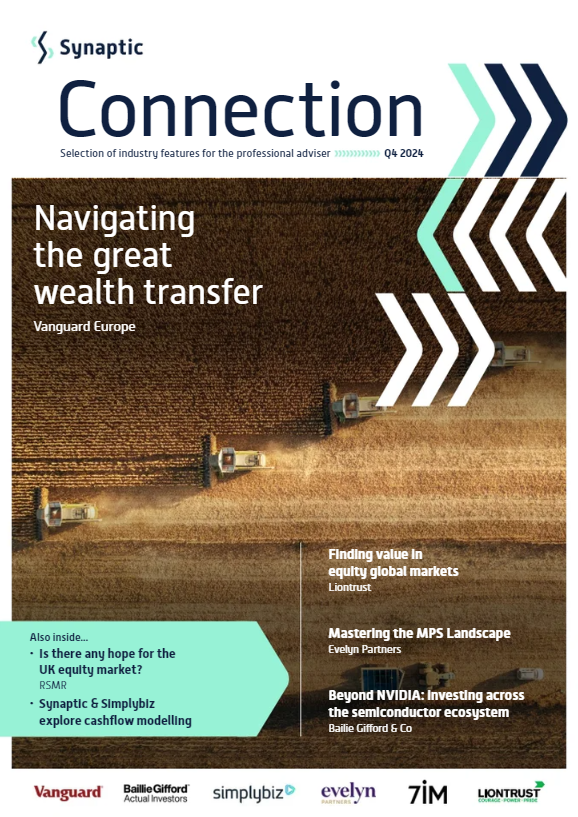In this edition...
- Navigating the great wealth transfer Warwick Bloore, Senior Specialist, Adviser Research Centre - Vanguard Europe
- How to keep up – tackling the risks of regulatory change Gareth Johnson, Head of Investment, Management Compliance - Simplybiz
- Beyond NVIDIA: investing across the semiconductor ecosystem Helen Xiong, Deputy Manager, Monks Investment Trust - Baillie Gifford & Co
- Finding value in global equity markets John Husselbee, Head of the Liontrust, Multi-Asset Investment Team - Liontrust
- Enhanced cashflow modelling Seb Marshall, Product Manager - Synaptic
- Worldly wisdom of The Wire Ben Kumar, Head of Equity Strategy - 7IM
- Mastering the MPS Landscape Mastering the MPS Landscape, Managing Partner, Head of UK IFA Services - Evelyn Partners
- A practical guide to getting your ongoing reviews in order Jennifer Peaty, Director of Regulatory, Consultancy and Advice Quality - Simplybiz
- Is there any hope for the UK equity market? Katie Sykes, Client Engagement & Marketing Manager - RSMR
- Cash-flow modelling Sandy McGregor, Head of Policy - Simplybiz
 Following the introduction of the Consumer Duty, the FCA has now fired its first warning shot towards the advice sector about the delivery of ongoing services.
Following the introduction of the Consumer Duty, the FCA has now fired its first warning shot towards the advice sector about the delivery of ongoing services.
This was delivered earlier this year in the form of an information request sent to twenty of the largest advice firms, selected to give the widest possible understanding of market practice in order to assess if any further regulatory work should be undertaken in this area.
The above approach should come as no surprise as in the Portfolio Strategy letters, sent to financial advisers and intermediaries in both 2022 and 2023, the FCA set out its concerns that advice firms were not adequately considering the relevance, nature, and costs of these ongoing services for all their clients. A message further emphasised in the Dear CEO letter issued in October 2024.
The FCA information request asked firms:
• Whether they reviewed their ongoing services as part of implementing the Consumer Duty.
• What changes they made in response to that review.
• Whether they delivered ongoing services to clients as promised in the past seven years; and
• The number of clients whose fees were refunded where the review did not take place.
A set of questions designed to serve as a reminder for firms to act in good faith towards customers, avoid causing foreseeable harm, and enable and support them to pursue their financial objectives.
Why is it important to take this warning seriously?
It is now a requirement for firms to carry out annual Consumer Duty outcomes monitoring, and an important feature of this process will be reviewing the delivery of ongoing services. The non-delivery of ongoing services, whilst taking adviser charges, presents a risk to a firm’s balance sheet. We have a capital adequacy reform coming down the line with a requirement to set aside capital where there is a known potential liability. The non-delivery of services would be an example of where a capital deduction requirement may arise.
Firms should also not assume that their professional indemnity insurance will cover claims in relation to non-delivery of services and, even if it did, in many cases the claim is likely to fall below the relevant excess on the policy.
Management information
What is absolutely key for advice firms in relation to ongoing reviews is management information. A firm must be able to provide accurate data in relation to ongoing monitoring and delivery. The FCA expects firms to have reconciled the number of clients who have an ongoing service agreement for advice with the ongoing fees received by the firm. Also important is the ability to record client contact points and have documented evidence in relation to the review assessment and outcome.
As we have seen from the firms selected for the FCA review, having robust processes and evidence of MI around ongoing reviews should definitely be an area of focus for firms at present.
What is your approach to disengagement?
Firms should have an approach to disengagement with clients where it is apparent the client is not deriving any value from an ongoing relationship. When a client will not engage, a firm needs a clear disengagement process which sets out the steps relating to number of attempts and method of client contact. It’s also important to evidence how the firm has attempted to explain to the client the importance of keeping ongoing suitability under review, and the potential consequences of not doing so.
Have you considered file checks on annual review cases?
Firms should also consider the quality of the annual review being provided. Can firms confidently say that the process in relation to ongoing reviews is in line with regulatory expectations? Does the client file evidence that the review has considered all necessary elements, and updated KYC where relevant, prior to re-confirming advice suitability in a client specific manner?
At Simplybiz, we are seeing an increase in firms submitting annual review cases into our Advice Quality Team to check that the standard is line with expectations. We have seen plenty of evidence to show firms who are in a good position, however we have also seen cases highlighting firms who have still got work to do to demonstrate and evidence that requirements are being met.
Where issues with cases have been noted, we have been able to support and assist firms to ensure that processes are robust and that all advisers are then following the firm’s process.
"It is now a requirement for firms to carry out annual Consumer Duty outcomes monitoring, and an important feature of this process will be reviewing the delivery of ongoing services."
Practical guidance
I thought it would be helpful to share some practical guidance for you to review your firm’s existing processes, and ensure that they are robust in meeting FCA expectations in relation to evidencing ongoing suitability assessments.
Important questions to ask yourself?
• Have you reviewed your ongoing service proposition in view of the Consumer Duty?
• Could you explain the changes you have made, or the reasoning where there are none?
• Do your customers understand the elements of the service? i.e. what is included, how this will be delivered, how often, and how much they pay?
• Are you up to date with your ongoing reviews?
• Do you have this data available to evidence?
• Can you spot non delivery and manage risk?
• Do you have the resources to deliver the required number of reviews?
• Do you monitor the quality of the ongoing advice service delivered?
• Do you have a disengagement policy?
• When would you consider a refund?
Recommended actions
• Review ongoing advice proposition for suitability and clarity.
• Engage a non-expert third party to provide a 'consumer view' of documentation.
• Ensure you have a central control mechanism with accurate reporting to manage review delivery.
• Monitor and review delivery management information in senior management meetings.
• Have a disengagement process for non-engaging clients.
• Maintain robust MI of disengagements and attempts to deliver.
• Engage a third-party expert to review the quality of your annual reviews.
By taking these practical steps, you can effectively manage ongoing suitability reviews, demonstrate to the regulator that you have a robust process in place that meets regulatory requirements, whilst also delivering good client outcomes under Consumer Duty.
The limited scope of the current focus from the FCA can be seen as an opportunity for firms to get their house in order as required. We believe many firms will be well placed to meet the regulator’s expectations (should they expand the current review) if they can ensure their processes are robust and followed consistently. Where firms have acquired client banks, or where there are resource challenges from advisers leaving the business, they may face a greater challenge.
Get in touch:
www.simplybiz.co.uk
01484 439100
info@Simplybiz.co.uk
Sign up for updates
Keep up to speed with everything you need to know each quarter, by email or post.


